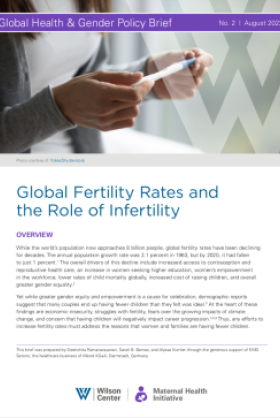Global Health & Gender Policy Brief: Global Fertility Rates and the Role of Infertility


While the world’s population now approaches 8 billion people, global fertility rates have been declining for decades. The overall drivers of this decline include increased access to contraception and reproductive health care, an increase in women seeking higher education, women’s empowerment in the workforce, lower rates of child mortality globally, increased cost of raising children, and overall greater gender equality.
Yet while greater gender equity and empowerment is a cause for celebration, demographic reports suggest that many couples end up having fewer children than they felt was ideal. At the heart of these findings are economic insecurity, struggles with fertility, fears over the growing impacts of climate change, and concern that having children will negatively impact career progression. Thus, any efforts to increase fertility rates must address the reasons that women and families are having fewer children.
In a new policy brief, Global Fertility Rates and the Role of Infertility, the Wilson Center’s Maternal Health Initiative explores the social causes and consequences of infertility, and strategies to address infertility in different contexts. Increasing knowledge about infertility and combatting stigma, improving access to infertility care, and supporting policies which make it easier for people to parent are critical to address infertility and sustain fertility rates.
Infertility impacts anywhere from 10 to 25 percent of couples of reproductive age globally, and it is associated with negative health outcomes such as poor mental health, chronic health conditions like cardiovascular disease, and complications attributable to infertility treatments. Infertility can have a variety of causes and can occur in both male and female reproductive systems. However, in 10 percent of incidences, infertility does not have a clear cause.
Greater investments are necessary to address the drivers of infertility and declining fertility. Providing widely available, accessible, and high-quality childcare can ease fears of financial instability and make it easier for people to have a child or multiple children. Workplace policies such as paid parental leave, flexible working hours, and employee fertility benefits create supportive workplaces to sustain higher fertility rates. Additionally, ensuring access to family planning to all individuals regardless of fertility rates in their country is critical to provide people with the ability to have their desired number of children and to control spacing between births
Authors

Maternal Health Initiative
Housed within the Wilson Center's Environmental Change and Security Program, the Maternal Health Initiative (MHI) leads the Wilson Center’s work on maternal health, global health equity, and gender equality. Read more

Explore More
Browse Insights & Analysis
How Education Can Empower Young Women in MENA

Empowering the Changemakers of Today: Young Women





